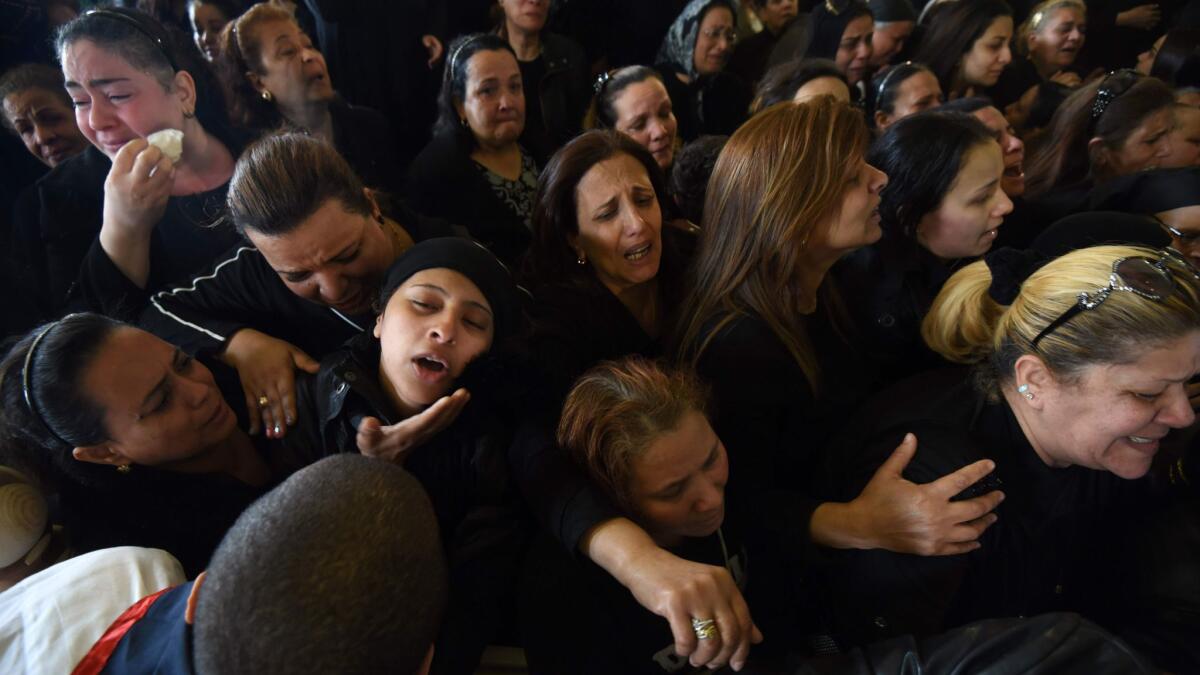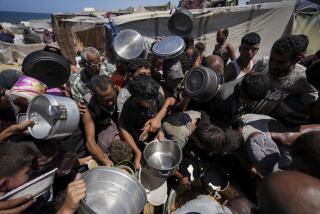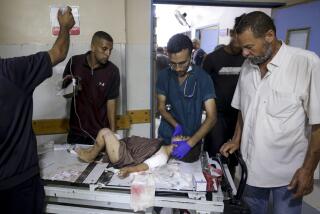After deadly bombings, Egypt’s state of emergency reassures some but strikes fear in others

- Share via
Reporting from Cairo — A day after Egyptian President Abdel Fattah Sisi ordered a state of emergency following two deadly church bombings, militants in the Sinai Peninsula fired a rocket into Israel on Monday, casting doubt on the president’s ability to counter a growing Islamist insurgency.
Sisi, a former general, rose to power four years ago on promises to confront extremists and secure the country and its economy after the overthrow of Islamist President Mohamed Morsi.
During a visit to Washington last week, Sisi portrayed himself as a moderate bastion against terrorism, deflecting criticism about his record of suppressing political dissidents and human rights activists.
“We agree on so many things,” President Trump said after meeting Sisi at the White House. “He’s done a fantastic job in a very difficult situation.”
But Sisi, once dubbed “the new idol of the Nile valley,” with sandwiches named after him and his face emblazoned on chocolates, has seen his standing decline at home. He now faces criticism not only from television hosts and columnists, but from average Egyptians in coffee shops, on street corners and on Twitter.
“Sisi has definitely not kept the country safe since becoming president,” said Hazem Hafy, 29, a Cairo University business school student who was walking in the busy Dokki neighborhood Monday.
He questioned what additional powers Sisi needs, saying the president already has “all kinds of authority.” “The current regime wants to cover its own problems up and hide behind emergency laws,” Hafy said.
The three-month state of emergency approved by Egypt’s Cabinet on Monday expands the government’s ability to monitor, detain and quickly try suspects. Civilians can be tried in emergency courts, which have no appeal process and issue verdicts that Sisi can amend, suspend or overturn.
It also grants the government greater power to monitor communications, censor and confiscate publications, impose curfews, close businesses and seize property.
People are starting to think, ‘Well, these people were targeted as they were praying, who’s to say this wouldn’t happen to me when I walk down the street?’
— Alaa Hamed, a Cairo math teacher
Some Egyptians said they were encouraged by the measures, which must be approved by parliament within seven days to remain in place.
“The emergency law is necessary after what happened,” said Alaa Hamed, a Cairo math teacher.
“People are starting to think, ‘Well, these people were targeted as they were praying, who’s to say this wouldn’t happen to me when I walk down the street, or to children in schools?’” said Hamed, 59.
For others, the state of emergency was but the latest in a long line of repressive measures dating back to the government of longtime strongman Hosni Mubarak, who was ousted in the 2011 “Arab Spring” protests.
“What will be different about this emergency law? Can we protest right now? No, of course not, because effectively we are already living under emergency law,” said Mona Hatem, 32, who works at a Cairo import company. “Really, the emergency law has been around since Mubarak. But has it worked for us? No.”
Magda Naguib, a 66-year-old Coptic Christian, was disturbed by Sunday’s bombings, which killed 45 people and wounded more than 100. But she said the new state of emergency made her feel even less safe.
“How will it work? We don’t know anything yet. Will it target me or you? How do they know who’s a terrorist and who isn’t?” said Naguib, as she emerged from a Cairo metro station.
David Butter, an Egypt analyst at the London think tank Chatham House, said Sisi’s response was not surprising, given the scale and frequency of recent attacks.
“Security and turning around the economy were a big part of his pitch, and a lot of middle-class people went along with him on both fronts,” Butter said. “It puts the onus on him to do something.”
Samer Shehata, an associate professor of Middle Eastern politics at the University of Oklahoma, said it was significant that Sunday’s attacks targeted churches in mainland Egypt, home to 97% of the country’s population of 85 million, as opposed to the rugged northern Sinai, long the scene of a simmering Islamist insurgency.
“The violence, the terrorism, has now forcefully left Sinai and come to the delta, the mainland of Egypt, and is no longer going after security targets but civilians, and in particular the Christian community,” he said.
Shehata believes the extremists are attempting to ignite a sectarian war in Egypt, as was done in Iraq a decade ago. By attacking Christians, the militants are also taking aim at Sisi himself, he said, because “the Coptic community is an important base of support for this regime.”
Experts are skeptical, however, that Sisi’s strategy will reduce the number of attacks.
The state of emergency may help Sisi crack down on Morsi’s Muslim Brotherhood “but it won’t get at the real problem,” said Eric Trager, a fellow at the Washington Institute specializing in Egyptian politics. “The real problem is the Egyptian military refuses to adopt a counterinsurgency strategy in the Sinai. Until that changes, it’s hard to imagine the security situation improving.”
Instead of winning over the local population and mobilizing it to fight the extremists, Egyptian security forces “are going in heavy, casting a very broad net for their repression, to the extent that it’s alienating the local Sinai population,” Trager said.
In the meantime, the extremists are strengthening their ties to Islamic State in Syria, professionalizing their tactics and outreach.
Since Sisi took office, 2,000 Egyptian soldiers have died battling a small number of militants in Sinai, about 1,000 to 1,500, Trager said.
On Monday, Israel closed its Taba border crossing to those departing for neighboring Sinai after its anti-terrorism office warned of an “imminent” attack. The Israeli military later said that a rocket fired from Sinai hit a greenhouse, causing no injuries. Islamic State claimed responsibility for the attack through its media arm, Amaq.
The attack came hours before the start of the Passover holiday, when the Sinai Peninsula is a popular vacation destination for Israelis. It also came before a scheduled visit by Pope Francis to Egypt this month to mend ties with Muslim leaders.
Islamic State has waged a deliberate campaign against Egypt’s Coptic Christians, who represent about 10% of the population. The militants claimed responsibility for a suicide bombing at a Coptic chapel in Cairo in December that killed 29 people. In February, they displaced hundreds of Coptic families amid a series of targeted killings in northern Sinai.
Some in the Coptic community who once saw Sisi as a champion fighting Islamist extremists now fear he’s impotent. His state of emergency did little to reassure them.
“It will not help. Plus, it will affect the country’s economy in a negative way,” said George Gad, 58, a mechanical engineer who attended a funeral Monday for the 17 victims of the Alexandria attack, which his sister survived. “I would love for my sons to leave the country.”
Rida Ghattas Kamel, 55, a math teacher, traveled several hours by bus to attend the funeral, having watched coverage of the bombings the day before with his 20-year- old daughter. She became so distraught, he said, she collapsed.
“Why such Muslim people kill us?” she asked him. “We live together. We eat together. We study together. Why do they hate us and kill us?”
Kamel didn’t have an answer. And he wasn’t sure what to think of Sisi’s proposed state of emergency.
“I hope it can help prevent terrorism,” Kamel said.
But he did not feel more secure. He felt caught in the middle.
“Strict Muslims … are bombing our churches and killing us to put Sisi in an embarrassing situation: that he can’t protect Copts,” he said.
Special correspondent Medhat reported from Cairo and Times staff writer Hennessy-Fiske from Irbil, Iraq. Special correspondent Makarios Nassar contributed from Alexandria.
Twitter: @mollyhf
ALSO
Egypt’s Christians bury victims of bombings as Israel closes border at Sinai
Egyptian Christians flee Islamic State violence on Sinai Peninsula
Archaeologists in Egypt discover massive statue in Cairo slum
More to Read
Sign up for Essential California
The most important California stories and recommendations in your inbox every morning.
You may occasionally receive promotional content from the Los Angeles Times.











